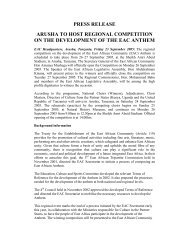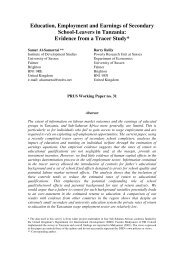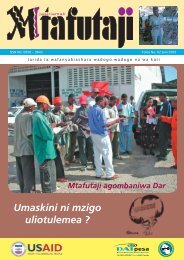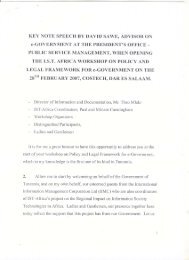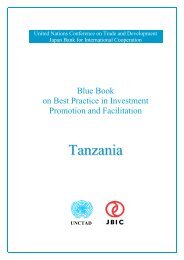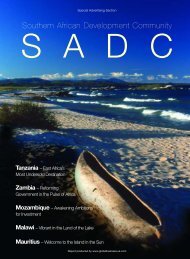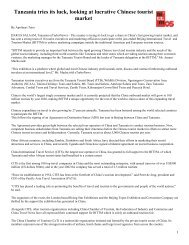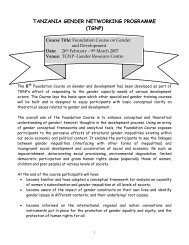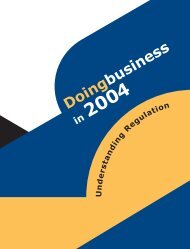Financial sector development - Sida
Financial sector development - Sida
Financial sector development - Sida
You also want an ePaper? Increase the reach of your titles
YUMPU automatically turns print PDFs into web optimized ePapers that Google loves.
Box 3. SIDA support for the establishment of the Bank of Namibia<br />
Between 1990 and 1995 about MSEK 55 were disbursed by SIDA for the Bank of Namibia project. The main<br />
objectives of the project were 1) to assist the government to establish a fully-fledged, self-sufficient and wellfunctioning<br />
central bank and 2) to contribute to the financing of the country=s own currency. Of the funds about<br />
1/3 were used for services and equipment in relation to the currency objective, 1/3 were used to establish the<br />
computer system of the bank and 1/3 were used for technical assistance and training of the other functions of<br />
the bank. The project was carried out in close collaboration with the IMF. Sweden provided the bank with a<br />
deputy governor (who was later nominated Governor), a training co-ordinator, an advisor on currency<br />
transactions and bank operations and a manager of the bank supervision department. According to an<br />
independent evaluation in 1995 the project has to a major extent fulfilled the mission of providing Namibia with<br />
a well-functioning central bank. At the macro-level this implies the leadership as regards monetary and foreign<br />
exchange policy and management. At the meso level this implies inter alia the ability to take the lead as the<br />
supervisor of the banking <strong>sector</strong>. At the micro level this implies to perform as an efficient organisation. By mid-<br />
1994 all major functions were held by Namibian staff members. As to the future, the evaluators recommended<br />
that the bank should improve its central bank competence in areas such as financial supervision, financial<br />
research and the <strong>development</strong> of money and capital markets.<br />
BITS’ technical assistance related to the financial <strong>sector</strong> in developing countries<br />
consisted mainly of the financing of studies and evaluations by the International<br />
Development Banks through Swedish Consultancy Trust Funds. Moreover, BITS<br />
provided substantial technical assistance to the financial <strong>sector</strong> in Eastern and Central<br />
Europe. Between 1992 and 1995, about 35 different projects were supported with a total<br />
amount of MSEK 50. For the next fiscal year, 15 new commitments at a total cost of<br />
MSEK 23 are planned in Eastern and Central Europe.<br />
The main emphasis of BITS technical assistance to Eastern and Central Europe has<br />
been on training in the banking and insurance <strong>sector</strong> in the Baltic States, Poland and<br />
Russia. In Poland, a total of MSEK 10 was granted for education and training in banking<br />
and finance. The programme was deemed successful in a recent evaluation, evidenced<br />
by the fact that 90 per cent of the people trained regularly used their newly acquired<br />
knowledge in their work. A similar programme in Russia was also found to have been<br />
successful, although the evaluators recommended important changes to be made in case<br />
of future support.<br />
In the field of cadastral and mapping support, which can be a powerful tool or prerequisite<br />
for developing financial markets, BITS has financed large programmes in the<br />
Baltic States and in Russia. Altogether more than MSEK 80 have been spent on these<br />
projects since 1989. These projects have recently been evaluated in four separate<br />
evaluations - one for each country - resulting in overall positive assessments.<br />
“New” <strong>Sida</strong> has so far initiated half a dozen technical assistance projects in the financial<br />
<strong>sector</strong>. Two of these projects are related to the building up of capital market authorities<br />
cum securities exchanges in Cap Verde and Tanzania. One project in Zambia supports<br />
the local stock exchange, and another in Zimbabwe supports the management function<br />
of a venture capital fund. See also Box 4 regarding the reform of the legal framework for<br />
securities markets in Bolivia.<br />
25



